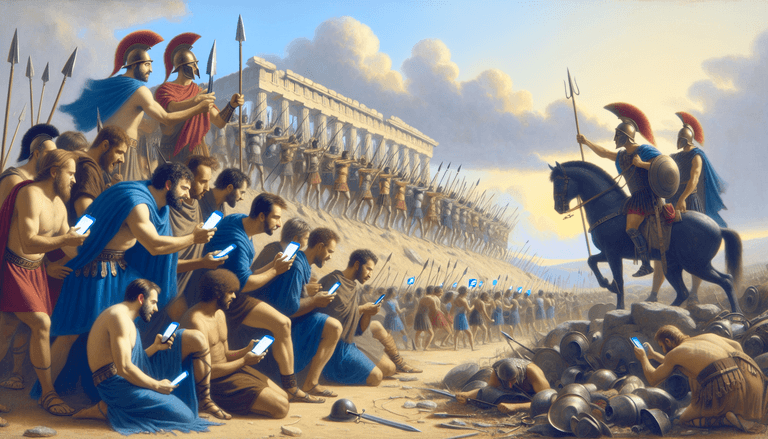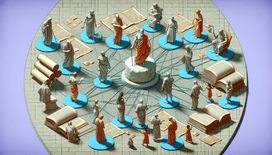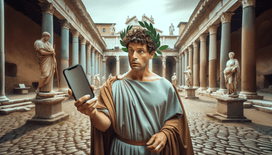Ah, the epic tale of the Trojan War, a grand narrative passed down through the annals of history, serenading us with stories of invasion, deception, and the ultimate star-crossed lovers, Helen and Paris. But as we ponder this legendary conflict, erupting from the poetic loins of Homer, one can't help but wonder: what if our ancient Grecian actors had access to the technological wonders of our time? Specifically, what role might instant messaging have played in this legendary siege?
Pressing buttons instead of launching a thousand ships
Imagine, if you will, King Menelaus, heartbroken and seething over the disappearance of his wife Helen, sitting in Sparta and discovering a WhatsApp message on his phone: "Paris has Helen. It’s complicated. 😳" Rather than assembling a ragtag fleet of Achilles wannabes and sailing off to war, how much more efficient might a sternly worded group chat have been? Menelaus's digital "Bring Helen Back or Else…" might have spared a multitude of Trojan lives while simultaneously leaving enough room for a cheeky emoji or two.
In our re-imagined war, Agamemnon's smartphone buzzes incessantly with passionate pleas from his brother. However, instead of plotting a siege, the coalition of Greek kings hunkers down to a strategy session over Zoom, debating the merits of peace talks versus a well-timed GIF warfare strategy using the dreaded pigeon memes. Instant messaging might allow for a war of words rather than swords, with unarmed combatants engaging in an epic battle of who can type faster under pressure.
Helen's digital dilemma
One wonders, too, about Helen and her choices. Armed with a smartphone, she could have put out her own PR statements on Twitter (or X as they might have called it ancillary dimensions). "Just to clarify, not kidnapped, willingly here with Paris. Love & light. 🌹" Her posts could start trending with hashtags like #HelenInTroy, #SpartaToTroy, and #MenWasteMyTime!
Perhaps she might have used Instagram stories to document her life in Troy, full of divine sunsets and sunset loads of vine leaves. Posts tagged with selfies next to the rustic ancient architecture with captions like, "New city, who dis?" might have influenced public opinion about her position between two sets of bickering kings. Helen's online influence might have transformed her from icon of betrayal to pioneer influencer.
For the love of emojis and the wooden horses
Let’s not undermine the Greeks’ most cunning ploy, the fabled Wooden Horse. Had this historical context been privy to instant messaging, one can only envisage Odysseus crafting messages like, "Horse inside gates. ;)" to his password-protected group chat. Dismissed as a glitch in translation perhaps, but practical for Odysseus to keep morale high amongst the horse-packed comrades clutching their smartphones in anticipation.
Trojans might have taken a more leisurely approach. Just imagine an exchange like:
- Trojan 1: "Massive wooden horse delivered. Thoughts? 🤨"
- Trojan 2: "Leave it outside till someone gets the code."
- Trojan 3: "Or just burn it 🔥"
Clearly, the Trojans might have endured fewer headaches, or ironically greater head-cracking revelations, had they WhatsApped their way through the conflict. Besides, the very concept of opening an unsolicited colossal equine structure might have struck more perplexity than anything (instant message communication be praised!).
The endgame that wasn't
Perhaps, with a WhatsApp feature allowing for voice notes, negotiations could have taken on a decidedly jealous tone, resolving longstanding differences over a three-minute audio clip littered with Gallic shrugs and Grecian Oaths. Heroism, as argued through the likes of multicultural emojis, potentially saves lives where no Achilles heel is apparent.
Ultimately, the potential for instant messaging to have impacted the trajectory of the Trojan War is both a tantalizing and humorous journey. Yet while tech might have altered the course of historia's past heartaches and wars, it's fascinating to see how our heroes might have adapted to inbox notifications, much like they adjusted to sky-sacrifices and chariot drag-races. Maybe the true lesson here is in the adaptability of the human condition, our quest for interaction is timeless, irrespective of the technology at hand.







